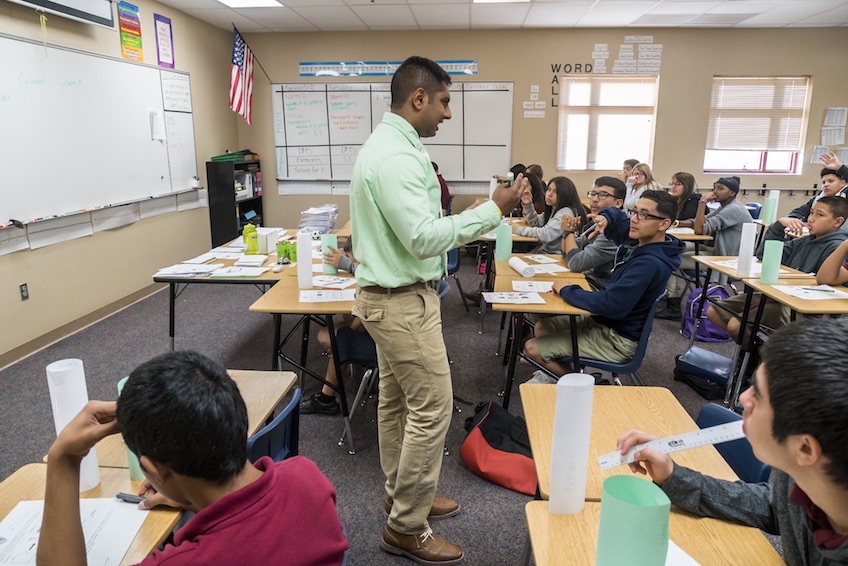September 17, 2015
How Practical Publications Enhance Teacher Learning
Did you think your reading days were over?
The Arizona K12 Center provides professional learning opportunities for educators statewide. What one might not know is the Center also strives to provide practical resources to enhance educational professionalism.
In an attempt to strengthen learning communities and promote teacher leadership from the classroom, the Arizona K12 Center is committed to providing publications that are meaningful and relevant for all educators. Three, in particular, offer nourishment for a healthy and strong educational backbone: The Standards Continuum Guide for Reflective Teaching Practice; Individual Professional Development Plan; and a special report from the Center’s Ninth Annual Teacher Leadership Institute Journey to 2030.
Taryl Hansen, Ed.D., National Board Certified Teacher (NBCT), is the Director of Teacher Leadership at the Arizona K12 Center. As a product of the Arizona public school system, she addresses the current state of the profession with an underlying and profound sense of hope for the future.
“Teacher leaders emerge from various years of experience. Teachers with less than three years’ experience are now supporting student teachers in their classrooms. That being said, teacher leadership is no longer for those with seven-plus years’ experience,” Dr. Hansen explained. “Our three documents work together to support building professional capital, encouraging teacher growth at every stage of a teacher’s career.”
Dr. Hansen joined the Arizona K12 Center in 2006, after spending 16 years in the classroom. Her experiences as an educator and leader in the field revealed she was the perfect candidate to assist with the Center’s publications.
“The goal of our publications is not only to implement programs or strategies based on standards, but to aim to inspire analysis and reflection on why the standards are important in practice and how they’re implemented by individual teachers in the connvarchar(max)s of their classrooms and communities. Arizona K12 Center publications will always have teachers and students as the focus,” she said.
Proven by their increasing demand, the most widely used of the three publications is The Standards Continuum Guide for Reflective Teaching Practice, based on the InTASC Model Core Teaching Standards. The resource provides a standards-based approach to reflective teaching practice and is intended to assist educators in growing professionally during all stages of their career.
Christie Olsen, NBCT, is a K-6 Instructional Coach in the Lake Havasu Unified School District. As a district employee since 1992, the Wyoming native said she once feared Lake Havasu was too far removed from rich, educational resources. Fortunately, she has found that’s not the case.
“We have been using The Standards Continuum Guide for about five or six years. We started by introducing it to the principals, using it to create questions and conversations around the teaching evaluation instrument. Then, my colleague, Erin Eppler, who is also a National Board Certified Teacher, and I took Lake Havasu’s teacher evaluation instrument and aligned it to The Standards Continuum Guide. This way, when a teacher receives a particular evaluation score, they can reference the guide as a crosswalk,” said Olsen.
The veteran educator described The Standards Continuum Guide for Reflective Teaching Practice in her own, practical terms: “It’s almost like a recipe book. Teachers can choose what they’re most interested in and focus on those areas. Maybe they won’t even look at other standards that year. Instead, they decide which flavor or meal course they want to focus on for the time being,” she explained.
Jaime Festa-Daigle, NBCT, is an assistant principal at Lake Havasu High School. Because evaluation is pivotal in her administrator role, she says she often turns to The Standards Continuum Guide.
“The document doesn’t just focus on the skill of instruction, but also leadership and collaboration. It looks at all aspects of being a teacher and helps me tailor my conversation about where a teacher is in their development,” Festa-Daigle explained. “I often bring the publication to teachers I think should consider the Arizona Master Teacher Program or National Board Certification. I use it to drive important discussions.”
As members of the Arizona TeacherSolutions Team, Olsen and Festa-Daigle have contributed their experiences in the Arizona K12 Center’s special report, Journey to 2030.
According to Dr. Hansen, the report is intended to inspire and foster dialogue about what teacher leaders can do to be the change in their communities. It offers insight and recommendations from experts in the field and Arizona teacher leaders on how to advocate for the profession at all levels of leadership, she adds.
The Arizona K12 Center’s Individual Professional Development Plan workbook was an inquiry-based workbook, used widely by Arizona Master Teacher districts as well as schools and districts across the state. This publication supports teachers as they walk themselves through a reflective process of goal setting and professional development planning.
As with any publication, updates are necessary. The Arizona K12 Center is proud to announce the release of the Professional Learning Plans. This newly revised publication will inspire learning communities to engage in a powerful, inquiry-based approach to professional learning through meaningful goal setting, data analysis and reflection. This, along with the Arizona K12 Center’s newest special report, Journey to 2030: Mindful Teacher Leadership in Arizona Schools and Communities will be available for purchase during the 2015-2016 school year.











